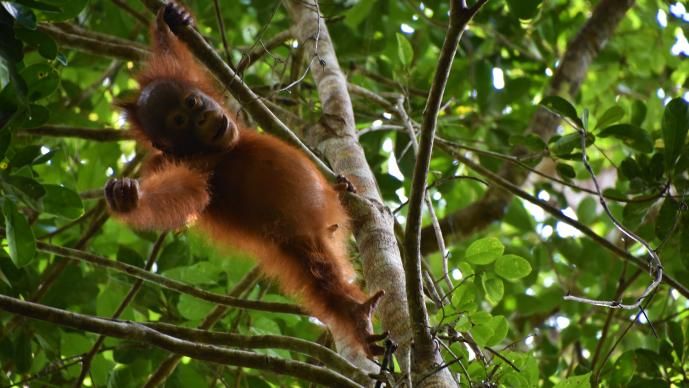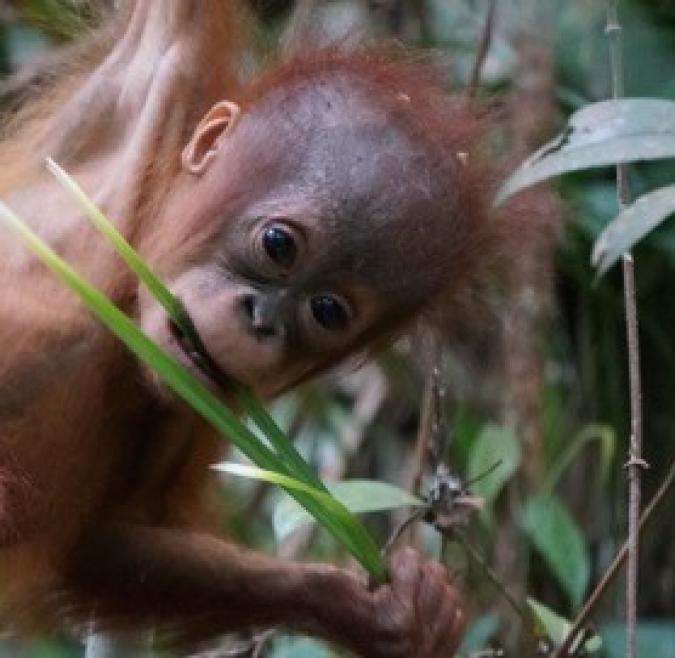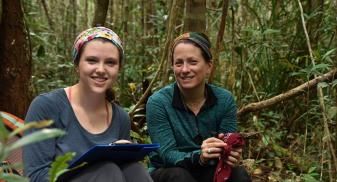Summer: Rutgers- Primates, Ecology, and Conservation in Indonesia
The Program
Study sustainable approaches to forest, wildlife, and marine management and see one of the last remaining populations of Javan rhinoceros in Ujung Kulon National Park.
Participate in the collection of behavioral data on wild orangutans, quantification of habitat characteristics, and the collection of biological samples. Participate in a field course with faculty and students from Universitas Nasional Jakarta (UNAS) and explore a variety of different views on important global issues.

Program Locations

Indonesia
Various
The 17,508 islands of the Indonesian archipelago are the home of nearly 250 million people, each of whom have their own distinct cultural identity yet have a strong sense of Indonesian identity. Indonesia supports a wide variety of highly unique flora and fauna that make their home in the temperate climate and fertile soil. The country pursues a moderate, tolerant growth strategy and is the third largest democracy in the world.
Academics
This program offers a unique opportunity for students to gain a hands-on immersive educational experience within Indonesia. The program will consist of two courses: “Advanced Primate Behavior and Ecology” and “Applied Conservation and Ecosystem Management,” each approximately 10 days in duration. The course is taught by Dr. Erin Vogel from the Department of Anthropology who has conducted research on wild orangutans in Indonesia for 17 years and Dr. Victoria Ramenzoni from the Department of Human Ecology who has conducted research on human ecology and marine fisheries in Indonesia for over a decade.
The first course will take place at Tuanan Biological Research Station in Central Kalimantan on the island of Borneo. Students will learn how to collect behavioral data on wild orangutans, quantify habitat characteristics, conduct biodiversity and primate surveys, collect biological samples, use GPS units and GIS software to generate maps, collect ethnographic data on sustainable livelihoods in the local community, and analyze and summarize data in the form of a scientific report. Students will also collect data for independent research projects with students from Universitas Nasional in Jakarta, and will present their results at a Biodiversity Symposium in Jakarta at the end of the course. Students also engage in a community development project in the village of Pasir Putih, which is about 1 km from the research station. In the past years, students have helped build a school, plant community gardens, and install clean water pumps for households.
After visiting Tuanan, we move the course to the island of Java to visit the famous Yogyakarta in Central Java. This city is known as the center for culture, arts, and beautiful temples in Indonesia. Here we will visit the 9th century Buddhist temple Borobudur and the Hindu temple Prambanan. Students will learn the art of Batik and experience a traditional Javan ballet.
For the final part of the trip, students will engage in the marine ecosystem conservation part of the course. We will end our trip at the Seribu Islands off the coast of Java where students will get to snorkel while observing beautiful coral reefs, participate in a marine sea turtle release program, and a coral reef restoration program. In addition, student will engage in a mangrove restoration program and visit various islands to learn about conservation efforts and sustainable energy solutions in these areas. At the end of our trip, we will go to Jakarta and participate in a Biodiversity Symposium at Universtas Nasional, our counterpart university.
The full program will take 3 1/2 weeks, which includes ten days for each course, and a brief stay in Jakarta at the end of the program. During these trips students will have the opportunity to experience some of Java's cultural traditions and learn about the history of Indonesia.
This program aims to provide students with a scientific foundation of information and skills necessary for successfully conducting future graduate studies or obtaining positions with NGOs and government organizations. In addition, students from Rutgers will integrate with students and faculty from Universitas Nasional Jakarta (UNAS), thus gaining a very unique educational and cultural experience.
For information about study abroad credit transfer, registration, and transcripts please visit the Academics section of our website.
Housing and Meals
For all portions of this course, meals will be provided. If students want to purchase extra snacks and food, there will be opportunities for them to visit local supermarkets. In all locations, bedding (sheets, pillows, blankets if necessary) will be provided, although students are welcome to bring their own sheets, pillows, and blankets/sleeping bags if they prefer.
- Jakarta: Students will stay at a small hotel in close proximity to UNAS.
- Palangkaraya: Students will stay at a hotel. Meals will be purchased at local restaurants. Students will be responsible for 1 dinner on their own.
- Tuanan: Students will stay in dorms at the research station. Meals will be prepared and served at the station. When students are on field excursions, packaged lunches will be provided.
- Jogjakarta: Students will stay at a hotel. Meals will be purchased at local restaurants.
- Kepulauan Seribu: Students will stay in a hotel. Meals will be provided by the hotel or prepared by local community members
Vaccinations
Students should consult the CDC website for recommendations on vaccinations. You can also ask Dr. Vogel for recommendations. Students can make an appointment with a doctor at Hurtado health center or their regular medical provider. Some vaccinations might not be covered by your insurance and will result in out-of-pocket costs.
Financial Information
Program Costs
| NJ Resident | non-NJ Resident | |
|---|---|---|
| Undergraduate | $4,580 | $5,240 |
Program Cost includes:
• Tuition
• Housing
• Most Meals
• Excursions
• In-country Transportation
• Administrative Fees
• Emergency Insurance Abroad
• (This program has been subsidized by the Rutgers Anthropology Department)
Out-of-Pocket Costs
| Airfare | $2,200 |
| Meals | $100 |
| Books and Classroom Materials | $50 |
| Personal Expenses | $200 |
| Total | $2,550.00 |
Out-of-Pocket Cost includes:
The above costs are estimations and represent the known out-of-pocket costs students encounter during their time abroad.
Some of these expenses will be paid for prior to going abroad, such as an airline ticket and visa costs, while some of these expenses, such as meals and local transportation, will be paid in-country as part of your daily expenses. As you plan, you will need to budget these costs and spend wisely throughout your time abroad.

